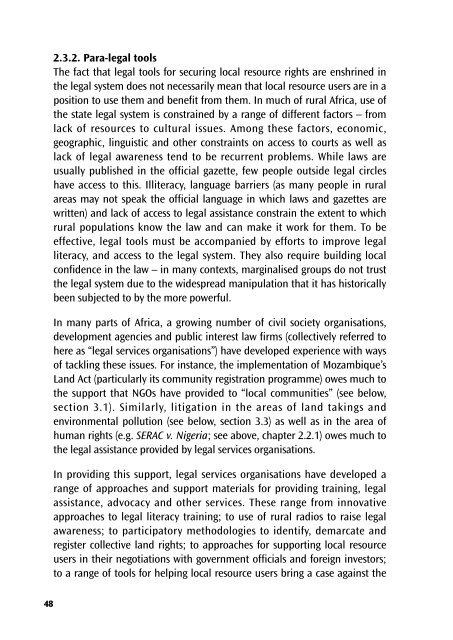Legal empowerment for local resource control
Legal empowerment for local resource control
Legal empowerment for local resource control
Create successful ePaper yourself
Turn your PDF publications into a flip-book with our unique Google optimized e-Paper software.
48<br />
2.3.2. Para-legal tools<br />
The fact that legal tools <strong>for</strong> securing <strong>local</strong> <strong>resource</strong> rights are enshrined in<br />
the legal system does not necessarily mean that <strong>local</strong> <strong>resource</strong> users are in a<br />
position to use them and benefit from them. In much of rural Africa, use of<br />
the state legal system is constrained by a range of different factors – from<br />
lack of <strong>resource</strong>s to cultural issues. Among these factors, economic,<br />
geographic, linguistic and other constraints on access to courts as well as<br />
lack of legal awareness tend to be recurrent problems. While laws are<br />
usually published in the official gazette, few people outside legal circles<br />
have access to this. Illiteracy, language barriers (as many people in rural<br />
areas may not speak the official language in which laws and gazettes are<br />
written) and lack of access to legal assistance constrain the extent to which<br />
rural populations know the law and can make it work <strong>for</strong> them. To be<br />
effective, legal tools must be accompanied by ef<strong>for</strong>ts to improve legal<br />
literacy, and access to the legal system. They also require building <strong>local</strong><br />
confidence in the law – in many contexts, marginalised groups do not trust<br />
the legal system due to the widespread manipulation that it has historically<br />
been subjected to by the more powerful.<br />
In many parts of Africa, a growing number of civil society organisations,<br />
development agencies and public interest law firms (collectively referred to<br />
here as “legal services organisations”) have developed experience with ways<br />
of tackling these issues. For instance, the implementation of Mozambique’s<br />
Land Act (particularly its community registration programme) owes much to<br />
the support that NGOs have provided to “<strong>local</strong> communities” (see below,<br />
section 3.1). Similarly, litigation in the areas of land takings and<br />
environmental pollution (see below, section 3.3) as well as in the area of<br />
human rights (e.g. SERAC v. Nigeria; see above, chapter 2.2.1) owes much to<br />
the legal assistance provided by legal services organisations.<br />
In providing this support, legal services organisations have developed a<br />
range of approaches and support materials <strong>for</strong> providing training, legal<br />
assistance, advocacy and other services. These range from innovative<br />
approaches to legal literacy training; to use of rural radios to raise legal<br />
awareness; to participatory methodologies to identify, demarcate and<br />
register collective land rights; to approaches <strong>for</strong> supporting <strong>local</strong> <strong>resource</strong><br />
users in their negotiations with government officials and <strong>for</strong>eign investors;<br />
to a range of tools <strong>for</strong> helping <strong>local</strong> <strong>resource</strong> users bring a case against the

















